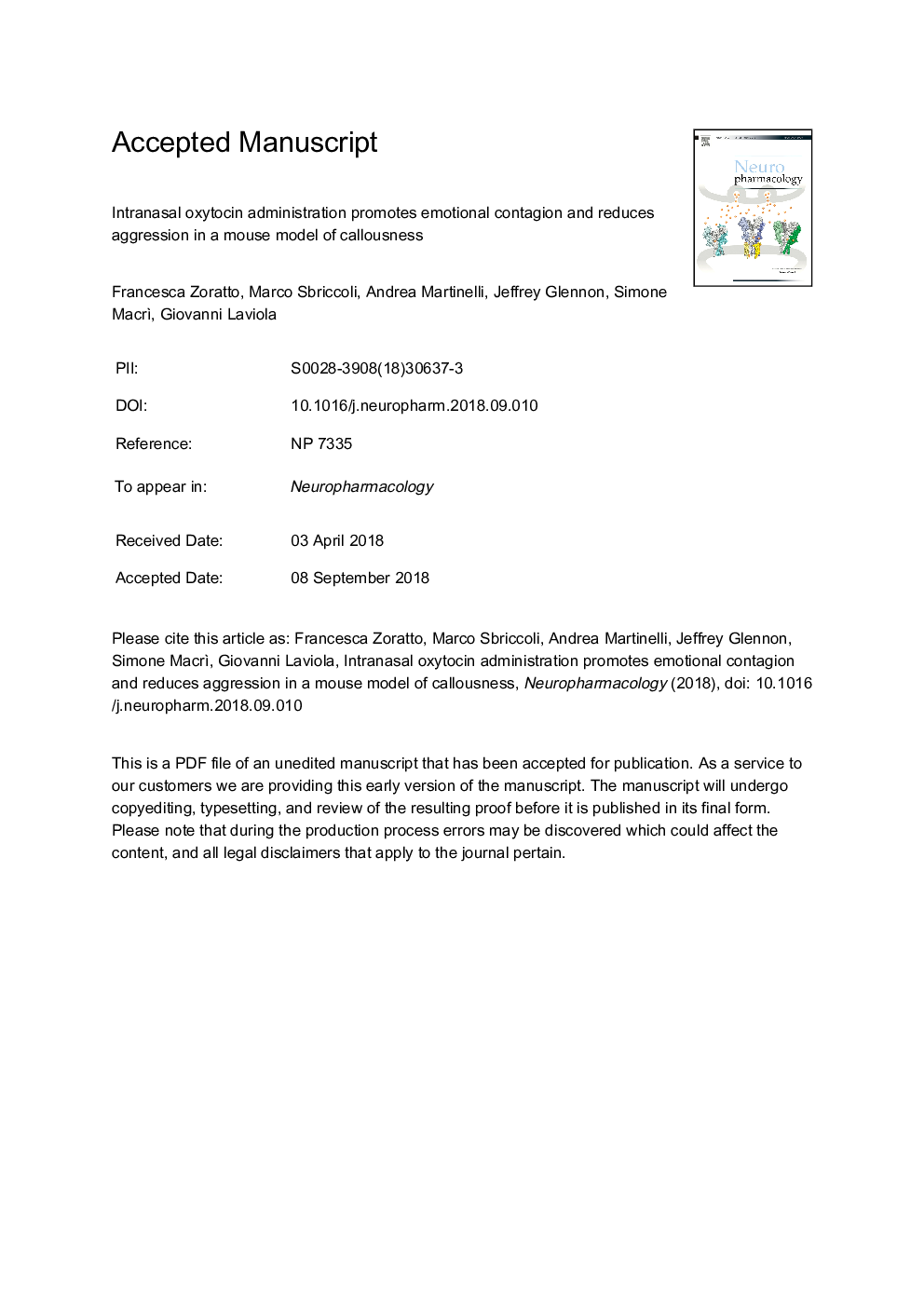| کد مقاله | کد نشریه | سال انتشار | مقاله انگلیسی | نسخه تمام متن |
|---|---|---|---|---|
| 11025776 | 1666518 | 2018 | 52 صفحه PDF | دانلود رایگان |
عنوان انگلیسی مقاله ISI
Intranasal oxytocin administration promotes emotional contagion and reduces aggression in a mouse model of callousness
ترجمه فارسی عنوان
مصرف اکسیتوسین اینترناسال باعث پرخاشگری عاطفی میشود و پرخاشگری را در یک مدل موشهای تخمدان کاهش می دهد
دانلود مقاله + سفارش ترجمه
دانلود مقاله ISI انگلیسی
رایگان برای ایرانیان
کلمات کلیدی
صفات خوابیده و بی روح، اختلال رفتاری، اختلالات فکری و روانی، همدلی برای درد، اکسی توسین،
موضوعات مرتبط
علوم زیستی و بیوفناوری
علم عصب شناسی
علوم اعصاب رفتاری
چکیده انگلیسی
Deficits in empathy, the ability to share an emotion of another individual, constitute a hallmark of several psychopathological conditions, including conduct disorder. The co-occurrence of excess rates of aggression, general violation of societal norms and callous-unemotional traits confers specific risk for adult psychopathy. In the present study, we relied on a recently devised experimental model of conduct disorder in mice to test the potential efficacy of intranasal oxytocin administration. Two subgroups of BALB/cJ male mice exhibiting opposite profiles in emotional contagion (i.e. socially transmitted adoption of another's emotional states) underwent a series of tests mapping onto reactive aggression, information processing, perseverative behaviour, punishment-related emotional memory, physiological arousal and hormonal stress reactivity, with or without intranasal oxytocin administration (5.0 or 20.0â¯Î¼g/kg). Collectively, our data indicate that a trait of markedly reduced emotional contagion is associated with a behavioural syndrome of sensorimotor gating deficits, impaired emotional memory, increased aggression and stereotyped behaviours, dysregulations in the circadian rhythms of activity and body temperature and dampened physiological reactivity to external stressors. Moreover, in the absence of changes in oxytocin receptor density in the neural network involved in empathy-like behaviour, we showed that oxytocin administration normalised emotional contagion, aggression and behavioural stereotypies, thereby ameliorating the phenotype of mice characterised by deficient empathy-like behaviour. Besides, oxytocin led to a lower, more prolonged neuroendocrine response of the HPA-axis to stress in all mice. Ultimately, current data support the notion that oxytocin may constitute a valid therapeutic approach in disturbances characterised by abnormal aggression and excess callousness.
ناشر
Database: Elsevier - ScienceDirect (ساینس دایرکت)
Journal: Neuropharmacology - Volume 143, December 2018, Pages 250-267
Journal: Neuropharmacology - Volume 143, December 2018, Pages 250-267
نویسندگان
Francesca Zoratto, Marco Sbriccoli, Andrea Martinelli, Jeffrey C. Glennon, Simone Macrì, Giovanni Laviola,
